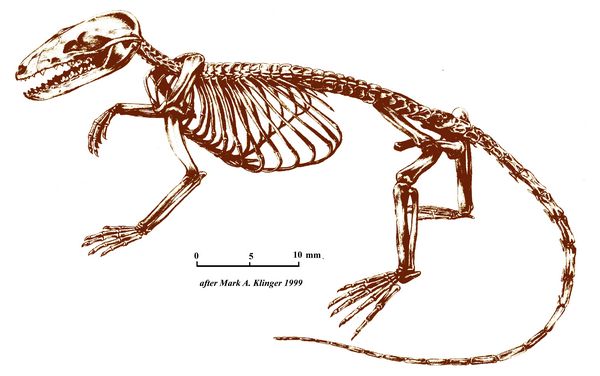Athena Review Image Archive ™
Jeholodens jenkensi

Jeholodens jenkensi (after Klinger 1999; Ji Qiang et al. 1999)
Jeholodens jenkensi
was an early triconodont mammal from the Early Cretaceous
period (ca. 125 mya), found in Liaoning Province, China.
The name derives from Jehol- , an ancient Chinese province in west Liaoning, -odens "tooth," and
jenkensi, for F.A. Jenkins. It is in the class Mammalia, the infraclass Triconodonta, and the order Eutriconodonta. Jeholodens occupies a very early, basal part of mammalian phylogenetic tree, outside the crown group of
extant Mammalia. As a Eutriconodont, it is much more derived than
Morganucodon, although it also retains some primitive features.
Jeholodens was found in the Yixian formation, at the site of Sihetun in Liaoning Province. The holotype (GMV 2139 a,b, at the National Geological Museum of China) is a nearly complete skull and a whole skeleton preserved as two fossil counterparts. As such, it represents the first fully articulated triconodont skeleton.
J. Jenkensi was a very small insectivore, with a skull 14-15 mm in length. It had large eyes suitable for night vision. Its relatively derived forelimbs and shoulder blades are comparable to those of modern opossums. It also had grasping, prehensile hands.
Its dental formula is 4-1-2-3/ 4-1-2-4, representing incisors, canine, premolars, and molars. The molars have three main cusps in a straight line (source of the name triconodont). The molar has a central cusp much higher than the two outer cusps, a primitive feature not seen in other Triconodontids. The molar cusp pattern and occlusion show an insectivorous diet. It also has spoon-shaped incisors, which are unique for Triconodonts.
References:
Qiang, Ji, Luo, Zhexi, Ji, Shu-An (1999). A Chinese triconodont mammal and mosaic evolution of the mammalian skeleton. Nature. 398 (6725): 326–30.
Copyright © 1996-2020 Rust Family Foundation (All Rights Reserved).